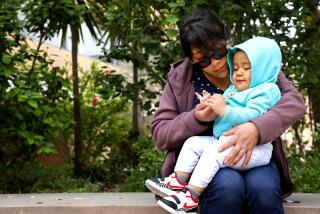A Life on the Road Ends on the Road : Bandit Shoots Free-Spirited Man in Mexico
- Share via
Since college, 31-year-old Wayne Warren had been smitten by wanderlust, lured especially by the romance of Latin America--its people, its open-air markets, its cross-cultural cafes, its intrigue.
And, as he lived on the road, he died on the road.
Warren was slain last week on a winding, narrow mountain road near mainland Mexico’s West Coast, shot by a highway bandit. His mother, Vail Warren of Solana Beach, is waiting for his ashes to be flown home so they can be distributed at sea.
Chances were that Warren would die far from home; he only spent a few weeks out of a year at his mother’s home. He had friends all around California--and even more in the small villages of Mexico--his favorite places, as well as El Salvador and Nicaragua.
It was there, in Mexico and Central America, where he could stretch a dollar forever and, with what Spanish he knew, charm himself into the homes of strangers-turned-friends, as he explored the landscapes and the people whose culture he loved.
His death appears simple enough: a bullet fired by a roadside bandit into the car in which he was a passenger, striking him just behind the right ear, splashing his blood everywhere and sending his two companions into near shock as they drove madly to the nearest hospital an hour away, long after it would do any good.
“Looking back, maybe we should have stopped when we saw them,” said Tony Sands, Warren’s buddy since high school and today a teacher at a day camp operated by the Los Angeles Unified School District.
Sands, 31, and another Los Angeles school teacher, Sonia Comacho, 24, had spent the month of July in Cuernavaca, Mexico--about an hour southwest of Mexico City by car--learning Spanish at a private school.
Sands was so enthralled by the region that he talked Comacho into returning with him to Cuernavaca for one last vacation before school resumes Friday.
Warren, not one to pass up such an invitation, joined them last week at Cuernavaca, taking with him topographical maps he purchased in Mexico City to help them plan their return trip to Zihuatanejo and up the West Coast.
That’s how Warren planned his future: not with resumes and job searches, but with road maps to places unknown.
The road--Highway No. 134--was worse than anyone expected, with potholes that could almost swallow Sands’ Nissan Pathfinder four-by-four utility vehicle.
They stopped at small villages along the way for food and drink, and to talk to the townsfolk and to visit their markets. “Wayne always said you could learn most about the local culture by hanging out at their markets,” Sands said.
“About 4 that afternoon, we were cruising along and could see, about 40 yards ahead of us, two men--one on either side of the road--and both were armed. The guy on the left had what looked like a semiautomatic rifle; the guy on the right had a handgun,” Sands said. “They were motioning to us to slow down.
The group assumed that the two men were federales-- federal police. “We started to slow down. We figured it was a drug check or something. But, when we got within 20 yards or so, you could tell they didn’t have any official garb on.”
Said Comacho, who was driving: “They were dressed in brown, and the guy on the left had his face covered. Stopping for them just didn’t occur to me. When I saw who they were, I just took off.”
Sands yelled, “Go! Go! Go! Go!” Comacho accelerated, “and I noticed the guy on the right pointing his gun at us. I yelled, ‘Duck!’ and I bent over while she drove past them.
“I heard a shot, but I stayed down. I thought maybe there would be more gunfire from behind,” he said. They drove about 50 yards, around a corner, before stopping to assess the damage. “I looked around to see if Wayne was all right, and all I saw was blood, covering everything--him, the side windows, the back window, all over our stuff.”
Sands tended to Warren’s head wound with a pillow while Comacho drove as fast as she could down the mountain road. An hour later, they arrived in the coastal city of Zihuatanejo and frantically found directions to the local Red Cross hospital.
“They checked for a pulse. He was dead. They wouldn’t even take his body out of the car. They sent us to the funeral home.”
The townsfolk were accommodating and sympathetic; within hours, Sands had given statements to local officials and contacted the U.S. Embassy in Mexico City, where an official called Warren’s mother, Vail Warren, in Solana Beach with the news.
“I had just buried a longtime man friend earlier that day at Ft. Rosecrans Cemetery,” the 70-year-old woman said. “That night, the embassy called me to say my son was killed.”
A source at the U.S. Embassy in Mexico City said officials are watching the case closely. “We will follow up with the local authorities and be notified of what is found,” he said. “Our interest in the matter has been made known to them.
“Whoever these individuals were,” he said of the bandits, “it seems to me they were looking for a target of opportunity.”
State judicial police authorities in Zihuatanejo declined to provide details about the investigation or their findings, saying it is “too delicate a matter.”
Authorities said, however, that Friday’s shooting appeared nothing more than a random criminal outburst.
Said Warren’s mother: “This was definitely not a drug thing. Everybody wonders about that sort of thing. People have asked. But it wasn’t, not with him.”
Indeed, the balding, blond Wayne Warren was an athlete, a jogger, a man who would turn some women’s eyes but who had no interest in himself settling down with a wife. He was married to his journeys, Sands said.
“He was a free spirit. He was restless. If we ever stayed in a town for even a week, he would still want to at least change hotels.”
Warren financed his early travels with a gift of money from his stepfather, Tully Warren, a retired political science instructor at Cal State Los Angeles. Later, he turned to odd jobs and small business ventures--like working with a friend in the produce business--to make just enough more money to travel some more.
Warren had gone to Calgary to watch the Winter Olympic Games, and to Seoul for the Summer Olympics; he had traveled throughout Southeast Asia and had visited Mexico dozens of times.
Everywhere he went, he took pictures. If no one was around to photograph in front of the scenery, he would hold his camera at arm’s length and shoot backwards, getting himself in the frame.
Sands and Comacho said Warren never clearly explained his love for Mexico to them, but he was clearly smitten with the country.
In fact, in recent weeks he started talking of settling down--by joining the Peace Corps and asking for an assignment in Mexico.
“He wanted to experience everything, to go everywhere and to experience as much life as he could,” Comacho said. “He told me that, now that he’s traveled all over the world, he wanted to experience some stability--by joining the Peace Corps.”
His mother said she is trying to reconcile herself to her son’s death. “I can’t tell you how many people--friends of his--have called me from afar. After all the byways he’s been on, this was a great surprise. I was always afraid something would happen to him--and that I’d never know.
“People, when they travel, need to be wary.”
More to Read
Sign up for Essential California
The most important California stories and recommendations in your inbox every morning.
You may occasionally receive promotional content from the Los Angeles Times.













